Mostly positive ions - Study guides, Class notes & Summaries
Looking for the best study guides, study notes and summaries about Mostly positive ions? On this page you'll find 677 study documents about Mostly positive ions.
Page 4 out of 677 results
Sort by
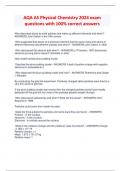
-
AQA AS Physical Chemistry 2024 exam questions with 100% correct answers
- Exam (elaborations) • 29 pages • 2024
- Available in package deal
-
- $13.99
- + learn more
AQA AS Physical Chemistry 2024 exam questions with 100% correct answers Who described atoms as solid spheres that make up different elements and when? - ANSWERS John Dalton in the 19th century Who suggested that atoms of a particular element had the same mass and atoms of different elements had different masses and when? - ANSWERS John Dalton in 1803 Who discovered the electron and when? - ANSWERS JJ Thomson, 1897 discovered electrons proving atoms weren't indivisible or solid. New m...
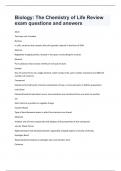
-
Biology The Chemistry of Life Review exam questions and answers.
- Exam (elaborations) • 7 pages • 2024
- Available in package deal
-
- $14.49
- + learn more
Atom The basic unit of matter Nucleus In cells, structure that contains the cell's genetic material in the form of DNA Electron Negatively charged particle; located in the space surrounding the nucleus Element Pure substance that consists entirely of one type of atom Isotope One of several forms of a single element, which contains the same number of protons but different numbers of neutrons Compound Substance formed by the chemical combination of two or ...
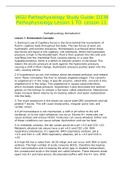
-
WGU Pathophysiology Study Guide: D236 Pathophysiology Lesson 1 TO Lesson 11
- Class notes • 28 pages • 2022
-
Available in package deal
-
- $18.50
- 4x sold
- + learn more
WGU Pathophysiology Study Guide: D236 Pathophysiology Lesson 1 TO Lesson 11 WGU Pathophysiology Study Guide: D236 Pathophysiology Lesson 1 TO Lesson 11: Pathophysiology Remediation Lesson 1: Homeostasis Concepts 1. Starling's Law of Capillary forces is the force behind the movements of fluid in capillary beds throughout the body. The two forces at work are hydrostatic and osmotic pressures. Homeostasis is achieved when these two forces are equal in the capillary- cell interfaces. When ...
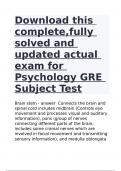
-
Download this complete,fully solved and updated actual exam for Psychology GRE Subject Test|GUARANTEED SUCCESS
- Exam (elaborations) • 65 pages • 2024
-
- $15.99
- + learn more
Brain stem Connects the brain and spinal cord includes midbrain (Controls eye movement and processes visual and auditory information), pons (group of nerves connecting different parts of the brain; includes some cranial nerves which are involved in facial movement and transmitting sensory information), and medulla oblongata (control center for heart and lungs regulating breathing, sneezing, and swallowing) Diencephalon Base of brain includes thalamus (relay station for signals coming in...
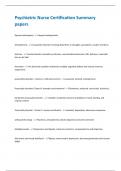
-
Psychiatric Nurse Certification Summary papers
- Exam (elaborations) • 16 pages • 2024
-
- $8.49
- + learn more
Psychiatric Nurse Certification Summary papers Zyprexa (olanzapine) - atypical antipsychotic Schizophrenia - A psychotic disorder involving distortions in thoughts, perceptions, and/or emotions. delirium - mental disorder marked by confusion; uncontrolled excitement; ADJ. delirious, reversible but can be fatal Dementia - An abnormal condition marked by multiple cognitive defects that include memory impairment. personality disorders - Cluster a: odd and eccentric - paranoid, schizoid, ...
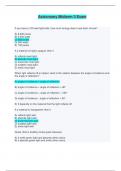
-
Astronomy Midterm 3 Exam - Questions and Answers (Complete Solutions)
- Exam (elaborations) • 29 pages • 2024
-
- $25.49
- + learn more
Astronomy Midterm 3 Exam - Questions and Answers (Complete Solutions) If you have a 100-watt light bulb, how much energy does it use each minute? A) 6,000 joules B) 6,000 watts C) 600 joules D) 600 watts E) 100 joules If a material is highly opaque, then it A) reflects most light. B) absorbs most light. C) transmits most light. D) scatters most light. E) emits most light. When light reflects off an object, what is the relation between the angle of incidence and the angle of reflection? A) angl...
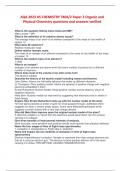
-
AQA 2023 AS CHEMISTRY 7404/2 Paper 2 Organic and Physical Chemistry questions and answers verified
- Exam (elaborations) • 23 pages • 2024
-
- $15.49
- + learn more
AQA 2023 AS CHEMISTRY 7404/2 Paper 2 Organic and Physical Chemistry questions and answers verified What is the equation linking mass moles and MR? Mass=moles * MR What is the definition of Ar (relative atomic mass)? The average mass of an atom of an element compared to the mass of one twelfth of carbon 12. What does Mr stand for? Relative molecular mass Define relative isotopic mass. The mass of an isotope of an element compared to the mass of one twelfth of the mass of carbon 12 ...
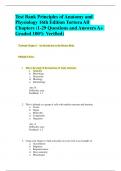
-
Test Bank Principles of Anatomy and Physiology 16th Edition Tortora All Chapters (1-29 Questions and Answers A+ Graded 100% Verified)
- Exam (elaborations) • 748 pages • 2023
-
- $19.49
- 1x sold
- + learn more
Test Bank Principles of Anatomy and Physiology 16th Edition Tortora All Chapters (1-29 Questions and Answers A+ Graded 100% Verified) Testbank Chapter 1. An Introduction to the Human Body Multiple Choice 1. This is the study of the functions of body structures. a. Anatomy b. Physiology c. Dissection d. Histology e. Immunology Ans: B Difficulty: easy Feedback: 1.1 2. This is defined as a group of cells with similar structure and function. a. Tissue b. Organ c. Mol...
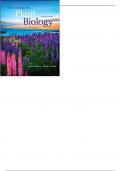
-
Stern's Introductory Plant Biology 14th Edition James Bidlack - Test Bank
- Exam (elaborations) • 479 pages • 2023
-
- $23.39
- 1x sold
- + learn more
Stern's Introductory Plant Biology, 14e (Bidlack) Chapter 1 What Is Plant Biology? 1) The early scientist who first demonstrated experimentally that plants do not have the same modes of nutrition as animals was A) Nehemiah Grew. B) Carl Willdenow. C) Alexander von Humboldt. D) Sir J. D. Hooker. E) J. B. van Helmont. Answer: E Topic: Diversification of Plant Study Bloom's: 1. Remember Learning Outcome: 01.04 List the aspects of botany with which each of the major botanical disciplines ...
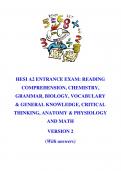
-
HESI A2 ENTRANCE EXAM: READING COMPREHENSION, CHEMISTRY, GRAMMAR, BIOLOGY, VOCABULARY & GENERAL KNOWLEDGE, CRITICAL THINKING, ANATOMY & PHYSIOLOGY AND MATH
- Exam (elaborations) • 81 pages • 2024
-
- $8.99
- 3x sold
- + learn more
HESI A2 ENTRANCE EXAM: READING COMPREHENSION, CHEMISTRY, GRAMMAR, BIOLOGY, VOCABULARY & GENERAL KNOWLEDGE, CRITICAL THINKING, ANATOMY & PHYSIOLOGY AND MATH VERSION 2 (With answers) Reading Comprehension Neurologists and biological psychologists have witnessed a sharp increase in the knowledge and understanding of particular structures of the brain over the past two decades. As technology becomes ever more advanced, scientists are able to isolate the functions of even small regions of ...

Do you wonder why so many students wear nice clothes, have money to spare and enjoy tons of free time? Well, they sell on Stuvia! Imagine your study notes being downloaded a dozen times for $15 each. Every. Single. Day. Discover all about earning on Stuvia


